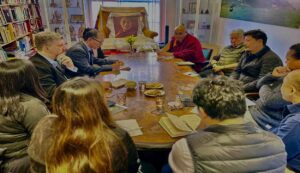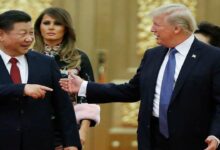Tibetan Parliamentary delegation visits Tibet Office in London
On November 22, 2024, a Tibetan legislative delegation headed by Speaker Khenpo Sonam Tenphel and included Members of Parliament Dawa Tsering and Ratsa Sonam Norbu concluded their four-day London Study Mission by visiting the Office of Tibet in London.

An important step in furthering the Tibetan cause in the international political sphere was taken when the delegation was welcomed by Tsering Yangkyi, Tibet’s representative in the UK, and the employees of the Office of Tibet, according to a news statement issued by the Central Tibetan Administration (CTA).
Speaker Tenphel presented the results of the delegation’s discussions with leading UK political leaders, specialists, and proponents of Tibet during a roundtable discussion with members of the Tibet Support Group (TSG), which CTA said was the day’s most important event.
The revival of the All-Party Parliamentary Group (APPG) for Tibet, a crucial forum for furthering Tibet’s cause in the UK Parliament, was one of the main topics of debate. As Tibet, Hong Kong, and Uyghur advocacy organizations are linked in their battle against repressive governments and in their attempts to raise awareness of human rights abuses, Speaker Tenphel emphasized the significance of increased collaboration between these groups.
Speaker Tenphel emphasized at the discussion how important it is to increase Tibet’s visibility on the UK’s legislative agenda. He urged for a concerted effort to guarantee that Tibet is given greater attention in international fora, with an emphasis on obtaining legislative changes like to the US Resolve Tibet Act, which would promote tangible measures on Tibet’s behalf throughout the world.
Enhancing international advocacy, opposing the Chinese government’s image of Tibet as a prosperous province under its control, and advocating for a more realistic representation of Tibet’s reality were other major topics of debate.
The People’s Republic of China (PRC) and Tibet are engaged in a complicated political, cultural, and religious dispute at the heart of the China-Tibet problem. In the early 1950s, Tibet—a historically separate area with a distinct culture, language, and religious traditions—was absorbed into China. The Dalai Lama and other Tibetan leaders have long demanded more autonomy or even complete independence, despite the Chinese government’s insistence that Tibet is an integral part of China due to historical links.
When Chinese troops brutally put down a Tibetan rebellion in 1959, the situation drastically changed, and the Dalai Lama was forced into exile in India. Since then, China has enforced stringent regulations over Tibet and implemented measures to assimilate Tibetans into the larger Chinese community.
These policies include limitations on religious activities, especially Tibetan Buddhism, extensive relocation schemes, and the promotion of the Chinese language. With opponents charging China with religious persecution, cultural repression, and the marginalization of Tibetans in their own country, these measures have drawn strong worldwide criticism.





